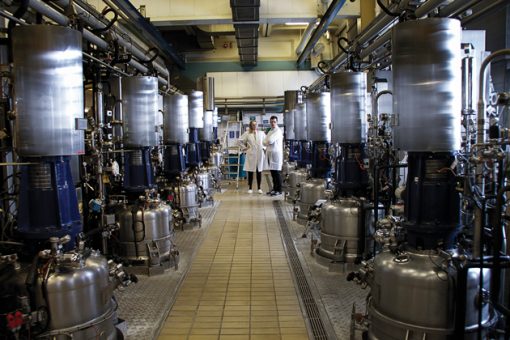Spotlight Novozymes: An Innovation Catalyst
December 13, 2018For decades, industries worldwide have used toxic chemicals like fertilizers, pesticides and antibiotics that are harmful to people and the environment to drive profits. Denmark-based Novozymes is working to replace those chemical processes with enzymes, naturally derived proteins that initiate biochemical reactions. This Knowledge Leader ferments enzymes into tiny granules and liquids to help customers to produce more with less.
If you eat bread or drink beer, you’re familiar with the work of enzymes. In nature, enzymes convert the food in our stomachs to energy and the fallen leaves in the forest to compost. The earliest known reference to the work of enzymes was in 800 B.C. by Homer, who wrote about making cheese. The beauty of enzymes is they can be used to catalyze industrial processes using less of everything — less energy, less water, less nutrients — and because they are the change agents, unlike chemicals, enzymes don’t remain to become part of the final product.

Enzyme fermentation at Novozymes in Denmark, credit: ChemistryWorld and Novozymes.
Last year, Novozymes introduced new home cleaning technologies to remove body odors and stains from dirty laundry at any temperature, eliminating the need for hot water to save energy. Another technology quickly converts corn to sugar to increase yields in ethanol production. Industries like agriculture — especially soy and corn farmers — are particularly interested in Novozymes’ technologies due to the pressures of constant change. Here, Novozymes has developed microbes that coat seeds, helping plants to better absorb nutrients, reducing the need for fertilizers and increasing crop yield by 2-3%.
This year the firm launched an enzyme that targets and breaks down cell debris that builds up on the intestine walls of chickens. Delivered as a food additive, it allows chickens to absorb more nutrients from their food without negatively affecting the chicken gut microbiome. The firm also is collaborating on new probiotic nutrition products for dairy cows and beef cattle to reduce inflammation, control infections and eliminate the use of antibiotics. In Bangladesh last month, it launched an enzyme to pre-treat fabrics for textiles that is delivering a 50% time savings, 67% water savings and 50% energy savings.
Roughly a third of Novozymes’ sales are into the emerging markets, which the company sees as an important source of growth and which also face pressures to improve sustainability. In fact Novozymes says it was approached by one of China’s largest detergent makers to help analyze the environmental effects of its products and develop new ways to improve sustainability.
Much of Novozymes’ research comes from mushrooms, according to a report in BusinessGreen, because fungi are “one of the clearest examples of how the natural world has been collaborating with enzymes for different purposes for millions of years.” Novozymes’ microbial scientist Sara Landvik told BusinessGreen, “Development on the technological side has been huge … because you can use the enzymes … to save money, because it can reduce raw materials that go in, save on water usage, and save on the chemical or mechanical energy input. So it makes economic sense, plus there is more and more pressure on industries in general to have a cleaner outcome and reduce waste.”

Credit: Novozymes
Much of the firm’s research is based on the work of California Institute of Technology’s Dr. Frances Arnold, who received the 2018 Nobel Prize in Chemistry for her work conducting the directed evolution of enzymes. As the New York Times reported, “In the 1980s, Dr. Arnold tried to rebuild enzymes, but because they are very complex molecules built from different amino acids that can be infinitely combined, she found it difficult to remodel the enzymes’ genes in order to give them new properties. In the 1990s, she abandoned what she called her ‘somewhat arrogant approach’ of trying to create modified enzymes through her logic and knowledge, and examined nature’s way of doing things. She looked into evolution. ‘I realized that the way most people were going about protein engineering was doomed failure,'” Dr. Arnold said in the article. “‘To me it is obvious that this is the way it should be done.’”
With one of the biggest microbe databases in the world, the first place Novozymes looks for new solutions is its own microbe collection. If the right microbe is not in its collection, they look for it in nature. This fall Novozymes joined the Danish National Center for Education in Natural Sciences in a mass science experiment, sending more than 35,000 school children into the Danish forest to collect and map the largest collection of good bacteria in the world. The findings will be available publicly early next year.

Credit: Novozymes
In our research on Knowledge Leaders, when a company passes our quantitative screen – i.e. it invests enough in its future innovation to meet specific mathematic thresholds – we observe there also are certain qualitative practices these highly innovative companies share consistently, such as:
- They talk about innovation as a key focus of corporate strategy.
- They set R&D goals and commit to specific milestones.
- They practice sustainability: Knowledge Leaders don’t just invest in their own future, they also invest in the future of humanity.
So how does Novozymes stack up in these three common practices of Knowledge Leaders?
First, innovation is indeed key to Novozymes’ corporate strategy. A quarter of its staff is scientists. In its most recent annual report, the firm details a current innovation pipeline containing more than 100 research projects and boasts more than 100 new molecules it has brought to market since 2000. Today the company actually has more patents (about 6,500) than employees worldwide (about 6,200).
Second, Novozymes sets clear R&D goals. The firm publishes its commitment to spend 13% of sales on R&D, which currently has it ranking #1 in the materials sector according to our intangible-adjusted data. In 2017, Novozymes launched eight new products, keeping on track to meet a longer-term target of delivering 10 transformative innovations by 2020. Indeed, the company’s research accounts for two-thirds of the entire global investment in enzyme development.
And third, Novozymes is focused on sustainability. Its product line is putting good bacteria to work to accelerate production, save energy and reduce waste in 40 industries in 130 countries. The firm estimates its products helped reduce CO2 emissions by an estimated 76 million tons last year and aims to reach 100 million by 2020. In the future, Novozymes scientists hope to expand into water technology, deploying enzymes and microorganisms to improve quality, conserve use and clean wastewater.
As of 11/31/18, Novozymes was not held in the Knowledge Leaders Strategy.


